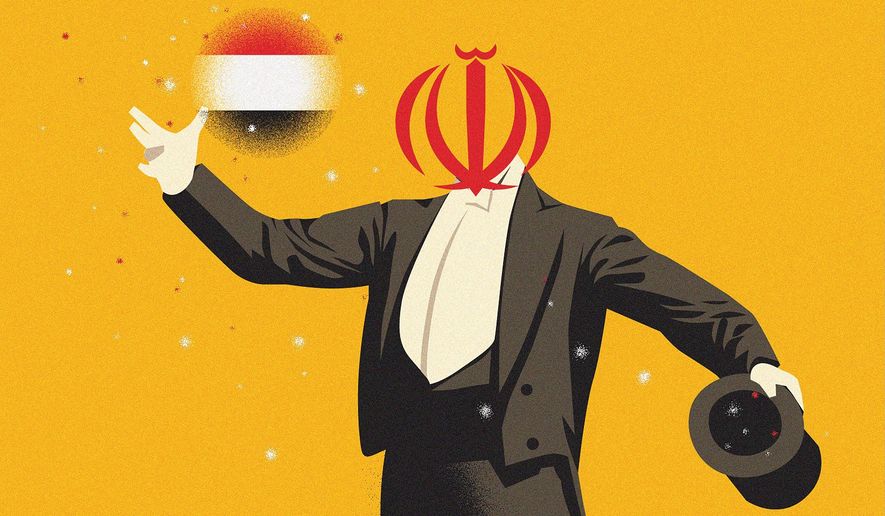OPINION:
When the magician tells you to look right, look left, because that’s where the action is.
Unfortunately, Congress looked right.
In a striking bipartisan vote, the Senate voted to keep the U.S. Embassy in Jerusalem. Good move, but not where the action is. Instead, the Biden administration has announced it has a series of steps planned to restore funds and political status to the Palestinian Authority, including the possibility of reopening the Jerusalem Consulate — understood as the American Embassy to the Palestinians.
The U.N., EU and U.S. all sanctioned Iran at some point since 1980. While effective in some areas, the sanctions did not prevent Iran from cheating on its nuclear and ballistic missile obligations. President Biden has announced an intention to return in some form to the 2015 JCPOA — and from there, to negotiate another, stronger deal. In response, Iran’s Foreign Minister Javad Zarif said the U.S. must first lift sanctions — most importantly, oil and banking sanctions, which are terrorism-sponsorship-related, not nuclear or missile related. Congress is working to prevent that. Good idea.
But the action on Iran is on the other side. In Yemen.
The president announced the lifting of the terrorism designation from Houthi rebels in Yemen, couched in diplo-speak: “This decision has nothing to do with our view of the Houthis and their reprehensible conduct, including attacks against civilians and the kidnapping of American citizens. We are committed to helping Saudi Arabia defend its territory against further such attacks.”
So, the Houthis are acknowledged to behave like a terror organization, and their “reprehensible conduct” includes the use of child soldiers, but the Biden administration plans to ignore that. Why?
Look left.
The goal is not the Houthis. If the administration believes sanctions relief for Iran will be stymied by Congress, one way to show the Tehran that President Biden is serious about negotiations is to lift a set of sanctions on an Iranian ally that provides an important and coveted base for Iran in the Red Sea.
Iran is at war not only with Israel and the United States, but with Sunni Islam. Saudi Arabia, home to Mecca and Medina, and Egypt, home of al-Azhar University are targets. Iran’s harassment across the Persian Gulf was a major factor in the Gulf States’ opening to Israel, but a base in the heel of the Saudi boot, i.e., in Yemen, puts Iranian military capabilities east and west of Saudi Arabia, and undermines Egypt, Jordan and Israel. It allows access to overland routes through Somalia, Eritrea and Sudan — and directly into Egypt through Sinai.
The Red Sea is the only Israeli outlet to the Gulf of Aden and then the Arabian Sea, the route of its trade with India and China. It is Jordan’s only sea outlet and only direct outlet, and the Eilat-Aqaba Free Trade Zone is a major source of trade revenue for America’s ally, King Abdullah II. For Egypt, it is the route to and from the Suez Canal.
Therefore, Iran has been stoking the Houthi insurrection in Yemen, providing, among other things, long-range missiles that have been fired into Riyadh. The 2019 cruise missile attack on the Abqaiq oil facility and Saudi airport were determined by the UN to be of Iranian origin. U.S. warships have intercepted Iranian weapons shipments intended for Houthi militias. Other shipments, originating in Iran, have been intercepted coming overland from Oman. All such shipments to the Houthis are in violation of U.N. resolutions.
If security and freedom of navigation for these allies are not sufficient reasons for the United States to be concerned with Iran at the chokepoint of the Bab el Mandeb Strait, consider this: Camp Lemonier, the U.S. naval expeditionary base, sits directly opposite Yemen off Djibouti. Camp Lemonier is home to the Combined Joint Task Force and is the only permanent U.S. military base in Africa.
Why is it there?
A map is helpful here. The coastal countries north of the Mediterranean Sea are all NATO members. Facing them, along the North African coast, are Sunni Muslim countries, all of which except Libya are partners in NATO’s Mediterranean Dialogue. The arrangement helps keep the Mediterranean stable and free for shipping.
One way to make North Africa less stable is to make the row of countries underneath it less stable. Chad, Mali, Somalia, Eritrea, Sudan and Niger all are targets of instability-seekers, including Iran.
The United States helps those governments more effectively control their own territory and borders, reducing the likelihood of transnational jihad. They are, to be sure, as much targets of Sunni jihad as they are of Iran, but Iran’s infusion of funds supports Sunni Hamas, al Qaeda, ISIS, Boko Haram, al Shabab and others. Instability, chaos, anti-Americanism, anti-Israelism, anti-Westernism and anti-Christianity are what Sunni jihadists seek — and they are what Iran seeks.
The State Department’s goal, according to a spokesman, is “a negotiated settlement that will end the war and the suffering of the Yemeni people.” But a war that is stoked by Iran for Iran’s purposes against Iran’s enemies leaves the Yemeni people without the ability to negotiate anything — terror designation or no terror designation.
Congress should not be led to look right when the mischief is on the left.
• Shoshana Bryen is senior director of the Jewish Policy Center and editor of inFOCUS Quarterly.




Please read our comment policy before commenting.